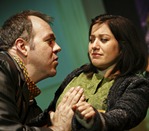SITE GUIDE
SEARCH
REVIEWS
REVIEW ARCHIVES
ADVERTISING AT CURTAINUP
FEATURES
NEWS
Etcetera and
Short Term Listings
LISTINGS
Broadway
Off-Broadway
NYC Restaurants
BOOKS and CDs
OTHER PLACES
Berkshires
London
California
New Jersey
Philadelphia
Elsewhere
QUOTES
TKTS
PLAYWRIGHTS' ALBUMS
LETTERS TO EDITOR
FILM
LINKS
MISCELLANEOUS
Free Updates
Masthead
A CurtainUp Los Angeles Review
| I could never presume to be an angel.—Mary
|

Meredith Bishop and Rob Nagle.
(Photo credit: Chris Gross.) |
Structural similarities aside, the play's premiere, a guest production at the Odyssey Theatre directed by Darin Anthony, crawls consistently under your skin and stays there. This is in no short measure due to the performance of Meredith Bishop, an actress whose best known credit had been one of the title character's relations in Nickelodeon's The Secret World of Alex Mack. Guess what? The lady's all grown up, and my word but she can act!
The character of Mary &mdash aka Scarlett &mdash played by Bishop actually feels three or four people mixed up inside a single damaged entity, all stuffed into a tight dress and draped by a formless hospital-like gown. Mary had been a prostitute, a quick witted tart with a thirst for words and books (Alice in Wonderland being a favorite) and a girl with a shrouded family history. She becomes a person of interest. This is not simply because she ends up withdrawn and largely incoherent, in a London psychiatric hospital, but because she was the last person to have contact with a Pakistani suicide bomber named Habib (Ammar Ramzi) before he blew up the aforementioned bus and its 13 passengers along with it.
Habib's ghost haunts Mary, and we see the two characters interact in flashback. Not surprisingly, Bishop's Mary takes on a couple of different incarnations with her terrorist john as well.
Mary's doctor is an art therapist named Bronwyn (Imelda Corcoran) who encourages drawing, mask making and anything else that might lead to a communication breakthrough. The hourglass is running out on said breakthrough &mdash despite Bronwyn's protests &mdash because a counter-terrorist agent named Wiggins (Rob Nagle) wants a few words with Mary. Wiggins puts the screws to the clinic's director Margaret (Ann Noble) who, in addition to being Bronwyn's boss, is also her former lover.
The scar of the title comes from a jagged half "z" taking up the better part of Mary's left cheek. We don't learn its origin (at least not until play's end), but we know it defines Mary enough to give her considerable pain and an alias.
Bronwyn's got some internal scars of her own: she has lost a child, an incident which makes Margaret's brusque decision to hand her ex this patient seem professionally questionable at best. Unlike in Equus, London's Scars does not build toward a shattering climax. There are revelations both for doctor and patient, but these are no more earth-shaking than the event that threw Bronwyn and Mary into the same orbit.
Even the agent, played with a nice sense of blue collar humanity by Nagle, seems to sense that a case of this sensitivity calls for something other than strong arm tactics. Noble's too officious Margaret excepted, these characters feel distinctly human. The playwright seems more concerned with questions of responsibility than with blame. And, yes, in the world of London's Scars, there is a big difference.
I enjoyed watching Bishop stack Mary's layers one on top of the other, seeing how a character this lonely could end up both in the wrong place with the wrong man and, ultimately, in the right place with the right woman. I didn't mind so much that Hirsch is giving us no indication that Mary is headed out of her darkness, although Bronwyn clearly is. London's Scars is a play of great insight, serious humanity and, above all, one quite marvelous performance.
|
London's Scars By Richard Martin Hirsch Directed by Darin Anthony Stage Manager: Laura Perez Cast: Imelda Corcoran (Bronwyn), Ann Noble (Margaret), Meredith Bishop (Mary), Ammar Ramzi (Habib), Rob Nagle (Wiggins/Man) Set Design: Stephen Gifford Costume Design: Sherry Linnell Lighting Design: Christine Wright Sound Design: Bill Froggatt Running Time: 2and 10 minutes hours with one intermission Odyssey Theatre. 2055 S. Sepulveda Blvd., L.A. (310) 477-2055 https://www.plays411.net/newsite/show/play_info.asp. From May 13 to June 27 Thu-Sat. @ 8pm, Sun @ 2 pm. Reviewed by Evan Henerson, based on May 15 performance. |
|
>
Subscribe to our FREE email updates with a note from editor Elyse Sommer about additions to the website -- with main page hot links to the latest features posted at our numerous locations. To subscribe,
E-mail: esommer@curtainup.comesommer@curtainup.com
put SUBSCRIBE CURTAINUP EMAIL UPDATE in the subject line and your full name and email address in the body of the message -- if you can spare a minute, tell us how you came to CurtainUp and from what part of the country. |
|
REVIEW FEEDBACK Highlight one of the responses below and click "copy" or"CTRL+C"
Paste the highlighted text into the subject line (CTRL+ V): Feel free to add detailed comments in the body of the email. . .also the names and emails of any friends to whom you'd like us to forward a copy of this review. You can also contact us at Curtainup at Facebook or Curtainup at Twitter and at Curtainup's /Blog Annex |





